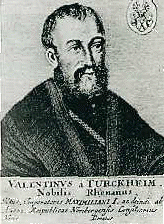Valentin Easter Day
Valentin Ostertag (* around 1450 probably in Dürkheim ; † before June 17, 1507 (burial) in Nuremberg , also called Dr. ju Valentinus Ostertag de Dürcken and the like) was a German lawyer in high public offices at the transition from the Middle Ages to the modern era .
Life
Valentine's nickname "Ostertag", which is commonly used as a family name in literature, means Easter Sunday. The oldest news about him can be found in the register of Heidelberg University , where he started studying law on April 3, 1470 . After completing his baccalaureate , he obtained a licentiate with an academic license to teach. In 1483 he is attested as dean of the law faculty . In 1493 he was awarded a doctorate in both rights ( lat. Juris utriusque ). He then worked for a number of years in various locations, including as a councilor at the Reich Chamber of Commerce, whose conference venue at that time was Frankfurt am Main . When the Roman-German King Maximilian I appointed him to his legal advisor in Nuremberg, he moved there. At his funeral five years later, the bells of St. Sebald and St. Lorenz rang . In a portrait he is respectfully referred to as “Nobilis Rhenanus” (Latin: a distinguished man from the Rhine ).
Services
Valentin Ostertag and his wife Margarethe left charitable foundations . The Valentin Ostertag Foundation set up by the widow in 1519 with an initial endowment capital of 2000 gold guilders for the benefit of the Dürkheim residents still exists today as the oldest private social and library foundation. Six men, the "sixes", manage the foundation. The widow Margarethe, whose surname was Haller von Hallerstein after two further marriages , certified 1509 (lost), 1511 and 1519. According to her last will in 1529, the foundation had to complete the following tasks every year:
- "Three pious children" should be supported with 20 guilders each with their marriage.
- A boy should be given a scholarship to study.
- On February 14th, the name day of the founder, every schoolchild in Dürkheim was to receive a “Veltens-Weck” , a Valentine's bread roll , as a souvenir.
In the course of time, the foundation's capital and the tasks of the foundation changed. But even today every Dürkheim pupil receives a wake-up call on Valentine's Day.
After Margaret's death, a legal dispute over the inheritance of Valentin Ostertag was conducted through several instances between her relatives. The court court of Heidelberg was the first instance in 1535, from 1537 to 1540 the proceedings ran before the Reich Chamber of Commerce .
literature
- Johann Georg Lehmann : Historical paintings from the Rhine district of Bavaria , Volume 2: Das Dürkheimer Thal , Heidelberg 1834, pp. 108-118
- Walter Dautermann among others: Bad Dürkheim, Chronicle of a Salierstadt . Palatinate Publishing House, Landau 1978
- Dagmar Drüll-Zimmermann: Heidelberger Gelehrtenlexikon 1386–1651 , Springer-Verlag Berlin, Heidelberg 2002, p. 148
- Hans von Malottki: Der Veltensweck von Bad Dürkheim , in: Die Pfalz, 58 (2007), 2, p. 16
Web links
Individual evidence
- ^ Toepke, Gustav (ed.): The register of the University of Heidelberg: From 1386 - 1553 , Heidelberg 1884, p. 329
- ^ Toepke, Gustav (Ed.): The register of the University of Heidelberg (2nd part): From 1554 - 1662 , Heidelberg 1886, pp. 407, 414, 415, 518, 533, 534
- ↑ Nuremberg City Archives: Marriage and death bells of St. Sebald and St. Lorenz
- ^ Valentin Ostertag Foundation: The Testaments
- ↑ Valentin Ostertag Foundation: The capital stock
- ↑ Landesarchiv Speyer, inventory E 6: Reich Chamber Court Trial No. 3252 ( page no longer available , search in web archives ) Info: The link was automatically marked as defective. Please check the link according to the instructions and then remove this notice.
| personal data | |
|---|---|
| SURNAME | Easter day, valentine |
| ALTERNATIVE NAMES | Valentin von Türckheim; Valentin von Dürckem |
| BRIEF DESCRIPTION | German lawyer |
| DATE OF BIRTH | around 1450 |
| PLACE OF BIRTH | uncertain: Bad Dürkheim , Germany |
| DATE OF DEATH | before June 17, 1507 |
| Place of death | Nuremberg , Germany |

